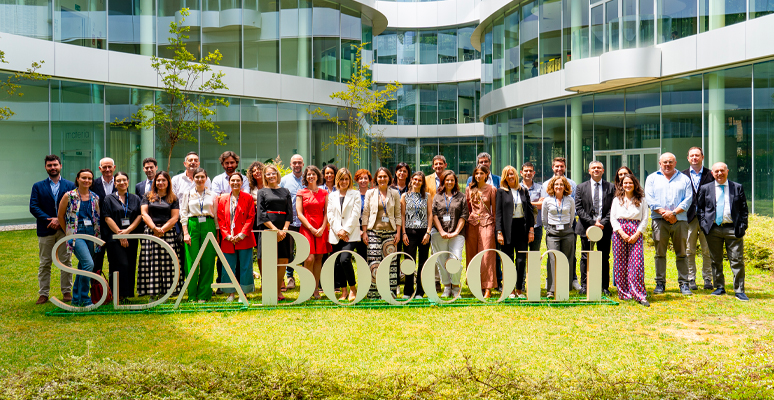Managing hybrid organizations and being able to use your strategic planning tools to produce public value. These were the first two topics covered in EMMAP, Executive Master in Public Administration Management‘s new format: #SFIDE (#CHALLENGES) is a series of webinars aimed at Alumni and professionals working for and with the PA, to discuss current and future challenges and possible tools to address them.
The first meeting in the series, “The Future of Public-Interest Services,” focused on the providers of public-interest services. In many cases, they combine their public function with private management models (for instance, SpAs i.e. joint-stock companies), creating tensions between the different priorities of these two identities. Eleonora Perobelli and Raffaella Saporito, EMMAP faculty, looked at these tensions through the conceptual lens of hybrid organizations. This concept is widely studied in academia, and makes it possible to clarify the physiological tensions within these entities, which arise from the coexistence of a typical public-sector purpose (achieving a social mission) with a private-sector one (e.g., complying with economic and financial balances, including by diversifying the portfolio mix, organizational models, etc.), and display solutions to deal with such tensions.
Raffaella Saporito coordinated a panel discussion to examine this proposal with three EMMAP Alumni, who were asked to investigate whether and how it is possible to reinterpret some of the challenges they encounter in their own management function through this typical public-management lens. Maurizio Barbati, General Manager Esacom SpA, described the different forms of hybridity together with their consequences in terms of accountability towards the commissioning bodies. Luca Federici, General Manager ATER Umbria, insisted that this category of organization needs to be able to represent the value it generates on both the financial and the social level, as much internally as for external stakeholders. Gianluca Postiglione, Head of Administration Regulatory and Purchasing Acea Ato5 SpA, highlighted how this hybrid nature impacts governance and the ability to balance priorities and needs of public and private shareholders, also in relation to stock market volatility. Although their industries are very different, the discussion revealed that the managerial challenges arising from the need to balance a public mission with typical private management logics are cross-cutting. Finally, Veronica Vecchi, EMMAP faculty, suggested a systematization of what had emerged, in order to outline a hypothetical agenda and work together on it. She underlined some important issues concerning, for example, the need to identify appropriate service delivery models (public/in-house vs. private/partnerships) and not standard solutions; the room that can be created for innovation in public purchasing processes, including through better public management skills and a clearer positioning of the PA as a “sophisticated buyer.”
The second meeting, “Towards the 2023-2026 Local Government Agenda,” addressed the challenges for municipalities, metropolitan cities and provinces, with a focus on the strategic and operational planning abilities of these entities, and their implications in terms of resources, monitoring and management tools. Giorgio Giacomelli, EMMAP faculty, put forward some keys for interpretation drawing on the concept of public value, as well as on budgeting and public performance measurement and evaluation systems. Silvia Rota, EMMAP Director, coordinated a panel discussion with EMMAP Alumni and senior managers from local governments. Francesco Bergamelli, Secretary General of the Municipality of Lissone and Secretary of UNSCP Lombardy, raised the issue of how to enhance the “responsibility” of public decision makers (administrators, managers, skills leaders). Lucia Cani, manager at the Municipality of Bassano del Grappa, focused on the enabling conditions that will be key for local governments to consolidate the innovations that the PNRR will make accessible in the near future. Concetta Orlando, Secretary General of the Metropolitan City of Genoa, spoke of how stakeholders (citizens and businesses) can be practically involved in the planning processes of public entities. Simone Simeone, manager of the Municipality of Taranto, spoke of how they are completing the reengineering of services and innovating the ways citizens can access them through choices, tools, digital platforms and innovative systems.
All keynote speakers introduced some cutting-edge management practices into the day-to-day life of public organizations with a view to managing the imposing challenges they are experiencing at this stage. Following up on the guests’ cues, Giorgio Giacomelli emphasized how managerial roles in local authorities today imply a certain willingness to take risks and find new solutions by leveraging the room for discretion within the regulation in a public-interest perspective. Risks have evidently to do with the uncertainty going with any innovation process: for this reason, it is essential to develop skills for interpreting external scenarios in order to define priorities based on the expected dynamics of needs.
#SFIDE will carry on with a series of webinars open to all those interested in the hottest topics for the PA agenda. In the coming weeks an ad hoc meeting will bring together managers of public and private services, to highlight the peculiarities and opportunities for mutual learning and integration in the practices of their respective fields.
These meetings offer us the opportunity to combine the interpretation keys suggested by EMMAP faculty with the field experience of our Alumni and top PA managers, embedding the teaching approach of our program in a context which is open to a public of professionals engaged with and for the PA, in a perspective of sharing and discussion to support public agencies and managers in facing the challenges that the Public Administration is experiencing today.
Silvia Rota and Eleonora Perobelli
SDA Bocconi School of Management






